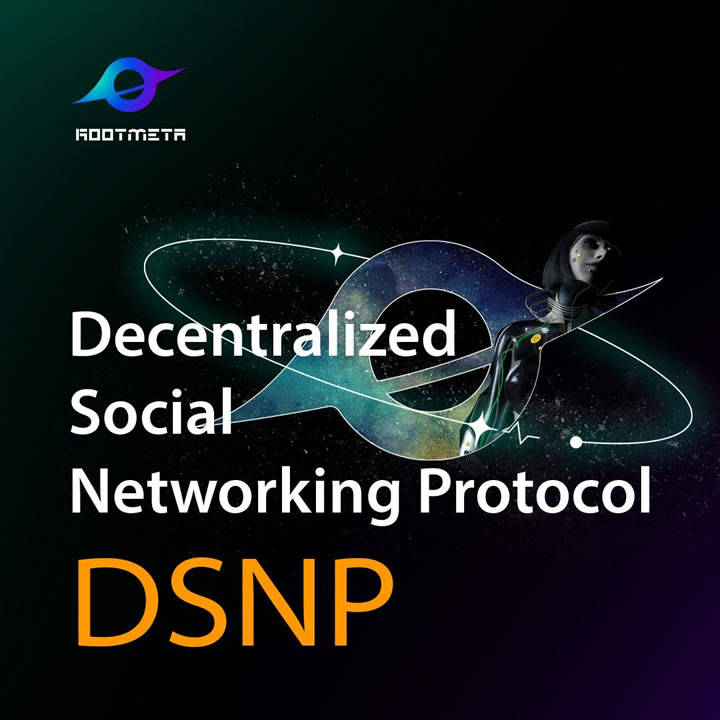Web 2.0 refers to webs that emphasize user-generated content and interactivity (social media and blogs). Contents and data generated are stored on centralized servers owned by major service providers such as Google or Meta.
So the power and influence of these companies behind social networks are immeasurable.
And they use a huge amount of data as currency for advertising. In response, we are moving toward the Web 3.0 era, where even more intelligent networks will be able to interpret and connect even more data in a decentralized way without intermediaries.
RootMeta builds a social networking protocol for Web 3.0 content publishing, instant messaging, metaverse space, and decentralized identity on top of Blockchain technology and encrypted cloud storage.
Its ecosystem provides one-stop solutions for crypto-asset display, DAO governance, content distribution, community maintenance, accurate traffic, and application entry, reducing the cost of user information screening and web 3.0 application management, and changing the user production relationship.
The aim of RootMeta is to better serve 20 million Web 3.0 users within 3 years.
What is Decentralized Social Networking Protocol (DSNP)?
Decentralized social networking protocols (DSNP) operate on independently run servers, rather than on a centralized server owned by a business. RootMeta is one example of a decentralized social networking protocol.
It is based on open-source software and functions a lot like Twitter and Discord. Blockchain technology allows data entries to be stored on servers anywhere in the world. It fosters transparency as data can be accessed in near real-time by anyone on a network.
Social media promotes connectivity, community building, and knowledge sharing. People can use social media to drive social and political change, bring awareness to important issues, raise funds for those in need, and promote their businesses.
However, social media’s ugly side can include cyberbullying, political misinformation, and even criminal activity. RootMeta gives users more control and autonomy. An individual can set up their social network and determine how it operates and what users can say.
How does RootMeta Work as a Decentralized Social Networking Protocol?
Decentralized social networks are defined by the following key characteristics.
Blockchain is a distributed ledger
Transparency is the most important feature of Blockchain.
Data on the open-source network allows anyone to access it in almost real-time. Because of its encrypted nature, Blockchain has restored some trust in the privacy of social networks. On the other hand, the chances of data theft are almost zero.
Users Have More Control
RootMeta’s decentralized social protocol, which is different from traditional social platforms, encourages independence without a centralized authority. Ownership, content management, and censorship of personal data are all within the user’s purview.
That is, no person or company has the right to impose its rules on other users or groups.
Decentralized social networking protocols give users more control. Unlike centralized social networking platforms, syndicates promote independence in the absence of central authority.
The benefits include censorship resistance, ownership of personal data, and better control over user-generated content. In other words, users do not accept censorship and insist on having the final say over their own content.
This means that no one, neither a company nor webmasters, can make changes to the content use generated. And no one can delete user-generated content.
Security & Privacy
The General Data Protection Regulation (GDPR) is a set of rules designed to give EU citizens more control over how companies from all over the world are allowed to use their data.
However, because social media companies are legally considered ‘data processors ‘, they retain rights to the data.
Users will be allowed to decentralized identifiers (DIDs) in RootMeta’s decentralized social protocol without having to associate them with identities such as email addresses or phone numbers.
In addition, decentralized social networks do not rely on a single entity to protect user data but often use public-key cryptography to secure the accounts. Decentralized social protocols offer another solution for data privacy and security.
On social networks, users can create accounts without having to be linked to a real-world identity, such as an email address or phone number. In addition, these networks typically rely on public-key cryptography to secure the accounts, rather than an individual entity to protect user data.
Censorship-resistance & Free Speech
Entities in traditional social networks are those who set the conditions for user participation. Users, on the other hand, set the rules in RootMeta’s decentralized social protocol. That is, no agency has the right to change or delete what people have created.
This feature has sparked a lot of discussions. On the one hand, some people argue that banning violent information helps protect users, while others argue that banning violent information is incompatible with the rights of free speech.
Users can prevent these groups from joining the network, but they cannot prevent them from doing so.
What Will the Future Look Like?
Over the past decade, social networks have been changing at such a rapid pace.
What began as a series of platforms that allowed people to connect and interact with each other has now become one of the main channels for brand advertising, including social and political campaigns.
Increasing censorship and privacy concerns have accelerated the growth of decentralized social networks. Moreover, as blockchain technology spreads globally, the competitive forces with tech giants are becoming more intense.
Some traditional platforms are already addressing the issue. For example, back in 2019, Twitter CEO Jack Dorsey said they were taking the first steps to becoming the first large-scale, traditional decentralized social network.
With these signs, the department expects RootMeta to take a huge leap forward in the coming years as the blockchain industry develops as a decentralized social networking protocol.
***
Join Rootmeta:
Twitter: https://twitter.com/The_Rootmeta
Instagram: https://www.instagram.com/The_Rootmeta/

